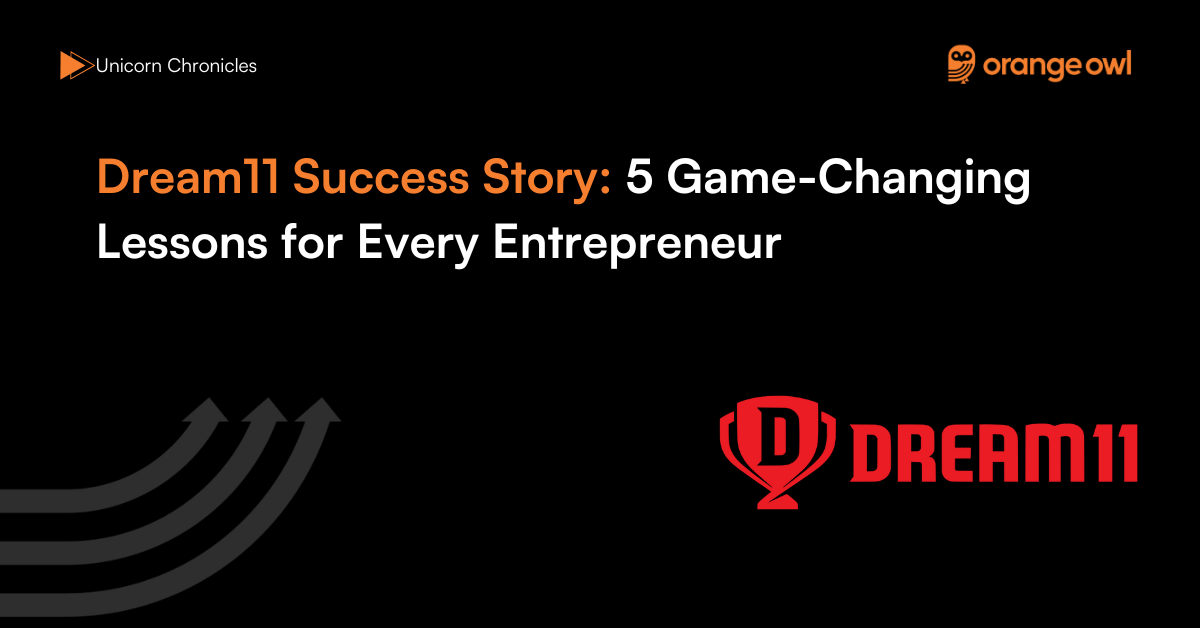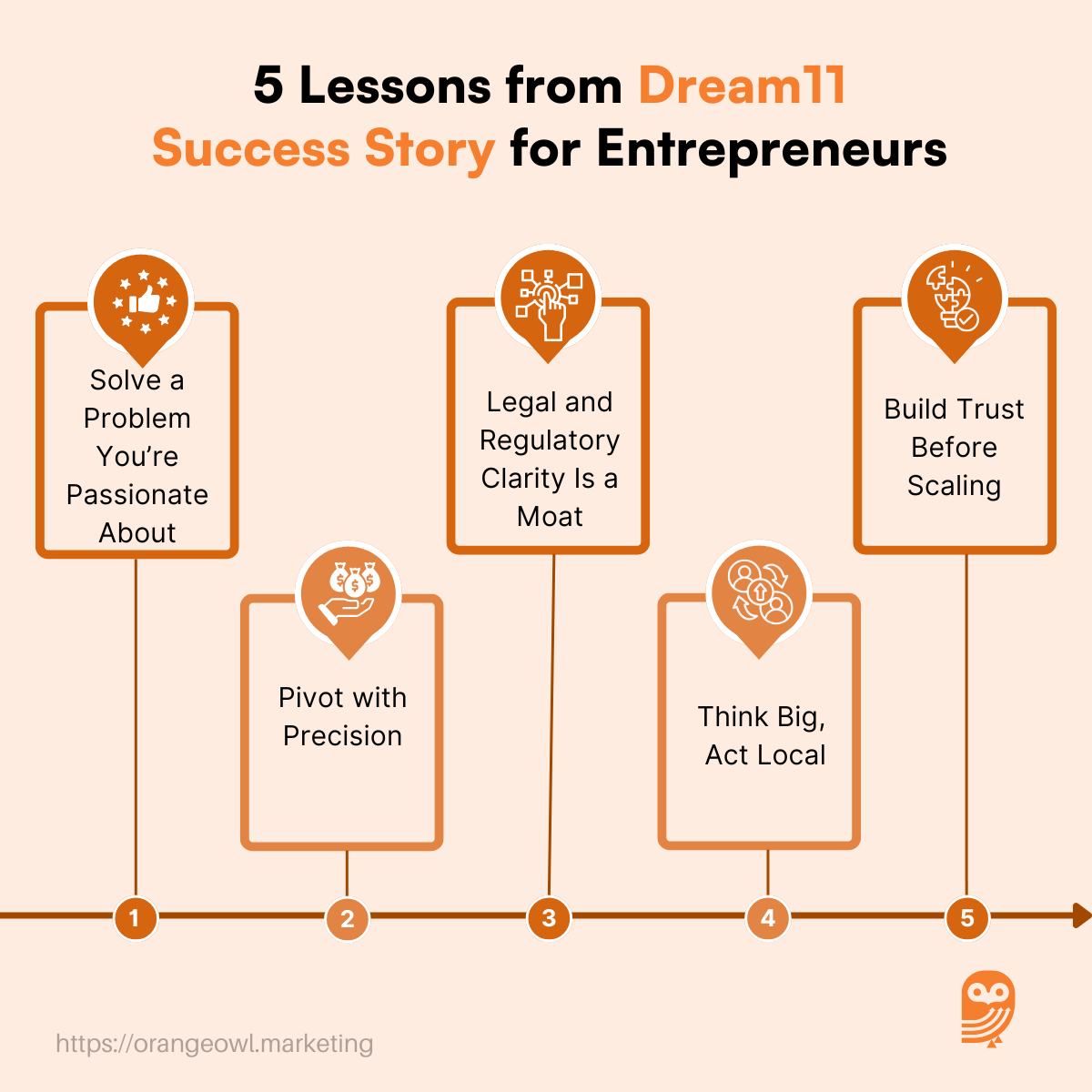Dream11 Success Story: 5 Game-Changing Lessons for Every Entrepreneur
Vivek Goel
June 16, 2025

Table of Contents
Introduction
In the fast-growing world of fantasy sports, Dream11 has not only emerged as India’s first gaming unicorn but also revolutionized how millions of fans engage with their favorite sports. Co-founded in 2008 by Harsh Jain and Bhavit Sheth, Dream11 today boasts over 180 million users and has become a household name for fantasy cricket, football, and kabaddi enthusiasts. Its journey from a bootstrapped startup to a billion-dollar brand reflects the power of perseverance, market timing, and product innovation.
Dream11’s growth trajectory is marked by significant milestones. In 2014, the platform had 1 million registered users, which grew to 45 million by 2018. By March 2024, Dream11 had surpassed 220 million users, adding 55 million new users in 2023 alone . Notably, 72% of these new users came from beyond the top 100 cities in India, highlighting the platform’s deep penetration into smaller towns and rural areas.
As Harsh Jain says in one of his interviews,
“Fantasy sports is not just about winning money. It’s about winning pride, bragging rights, and proving your knowledge.”
The Indian fantasy sports market itself is on an upward trajectory. Valued at ₹6,800 crore in FY22, it is projected to reach ₹25,240 crore by FY27, growing at a compound annual growth rate (CAGR) of 33% . Dream11’s success story is a testament to the burgeoning opportunities in this sector, driven by increasing smartphone penetration, affordable data, and a sports-loving population.
Origin Story
The inception of Dream11 was deeply rooted in co-founder Harsh Jain’s personal fascination with fantasy football during his time in the United States. As a passionate sports enthusiast, Jain was immersed in the fantasy leagues culture, and upon returning to India, he found a glaring gap—there was no equivalent platform for cricket, the nation’s most beloved sport.
Seizing this opportunity, he partnered with his childhood friend Bhavit Sheth in 2008 to create what would go on to become India’s leading fantasy sports platform—Dream11. However, their journey was far from linear.
The initial business model was ad-based and did not gain much traction. Indian internet users at the time were unfamiliar with fantasy sports, and the concept of winning based on player performance in real-life games was too early for mass adoption.
By 2012, after years of experimentation and limited success, the founders made a bold decision to pivot towards a freemium model, allowing users to participate in real-money contests.
“We had to wait until 2012 to pivot and make a real impact,” Harsh Jain shared in an interview, underlining how that move became the inflection point for Dream11.
The real-money model tapped into competitive spirit, sports passion, and a strong desire for engagement—ushering in a new era for the company and the fantasy sports industry in India.
Business Space and Early Challenges
The journey post-pivot, though promising, was riddled with substantial challenges. At the time, real-money gaming was a grey area in India. Legal clarity was lacking, and societal attitudes toward paying for online gaming were cautious, if not skeptical.
Dream11 found itself in uncharted territory, needing to educate the market while building user trust. As Bhavit Sheth reflected, “We were told a hundred times that this wouldn’t work in India.” Yet, the team remained resolute.
One of the biggest hurdles was proving the legality of fantasy sports. Critics questioned whether it was a game of skill or chance—a distinction that made all the difference legally. After years of litigation, the Indian Supreme Court upheld that fantasy sports required a considerable degree of skill, setting a precedent that legitimized Dream11’s business model.
In parallel, acquiring users for a relatively unknown concept in a cost-effective way was daunting. Additionally, Dream11 had to compete against well-funded international platforms trying to enter the Indian market.
Despite limited resources, the team focused on product quality, compliance, and community building to earn the trust of users. The early belief in the long-term potential of skill-based gaming and a strategic, education-focused approach helped Dream11 lay the groundwork for what would soon become a multi-billion-dollar fantasy sports ecosystem in India.
Growth Strategies
Dream11’s remarkable growth was the result of timely pivots, strong investor backing, and laser-sharp execution. A pivotal moment came in 2012 when the company transitioned to a freemium model, allowing users to try fantasy sports for free before participating in paid contests.
This move not only boosted user confidence but also created a scalable monetization model. Dream11 also adopted an aggressive digital-first approach to user acquisition, capitalizing on the rise of affordable smartphones and mobile internet in India.
In parallel, the company took a bold stance in pursuing legal clarity—ultimately becoming the first fantasy platform in India to be recognized by the Supreme Court as a game of skill, not chance.
This landmark legal recognition gave the company a competitive moat. With strategic funding from investors like Kalaari Capital, Tencent, and later Tiger Global, Dream11 scaled both its technical infrastructure and marketing efforts significantly. Moreover, their focus on cricket—a national obsession in India—proved to be a masterstroke.
By aligning their peak campaigns with the Indian Premier League (IPL), Dream11 witnessed explosive growth in engagement and user base. By 2019, the company became India’s first gaming unicorn, valued at over $1 billion, and by 2022, it had amassed more than 180 million users, establishing itself as one of the largest fantasy platforms in the world.
Marketing Strategies
Dream11’s marketing brilliance lay in its deep understanding of the Indian sports fan psyche and its ability to turn that insight into powerful, culturally resonant campaigns.
One of its most game-changing moves was becoming the title sponsor of the Indian Premier League (IPL) in 2020, placing the brand at the center of the nation’s most-watched sporting event.
This was complemented by collaborations with cricket icons like MS Dhoni and Rohit Sharma, whose association lent credibility and emotional depth to the brand. Dream11 also harnessed virality through well-structured referral programs, enabling rapid word-of-mouth growth.
Perhaps the most memorable aspect of their branding was the “Dimaag Lagana Hai” campaign, which cleverly positioned fantasy sports as a skill-based, intellectual pursuit rather than a game of luck.
As Harsh Jain put it, “We wanted users to see this as a sport in itself—where your knowledge, timing, and strategy matter.” This messaging was instrumental in distancing Dream11 from the stigma associated with gambling, while positioning it as a legitimate, skill-driven gaming experience.
5 Game-Changing Lessons for Every Entrepreneur
1. Solve a Problem You’re Passionate About
Harsh Jain’s fascination with fantasy football during his time in the U.S. wasn’t just a casual hobby—it sparked a vision. He noticed that while fantasy sports were booming abroad, there was no equivalent in India for cricket, the country’s most beloved sport. This personal passion became the genesis of Dream11.
When you build a business around something you deeply care about, you’re more likely to stay resilient through the inevitable setbacks. As Jain’s journey shows, passion doesn’t just fuel motivation—it inspires innovation and a long-term vision that can disrupt entire industries.
2. Pivot with Precision
Dream11’s original model, which relied on ad revenue from free-to-play games, didn’t gain traction. Rather than persisting with a failing model, Jain and Sheth made a bold pivot in 2012 to a freemium structure that allowed real-money contests.
This shift was driven by feedback, market behavior, and data, and it turned the tide for Dream11. The lesson here is clear: pivots aren’t failures—they’re strategic corrections. Entrepreneurs must stay flexible and data-driven, ready to adjust course when the original strategy doesn’t deliver expected results.
3. Legal and Regulatory Clarity Is a Moat
Operating in the relatively new and controversial space of real-money gaming in India came with major legal hurdles. Instead of skirting the issue, Dream11 confronted it head-on—seeking legal opinions, complying with state laws, and finally securing a landmark judgment from the Indian Supreme Court that declared fantasy sports as a game of skill.
This clarity gave Dream11 a unique edge, setting it apart from competitors and shielding it from future regulatory risks. For entrepreneurs in complex industries, this demonstrates how proactively addressing legal ambiguity can turn a vulnerability into a competitive advantage.

4. Think Big, Act Local
While the fantasy sports concept was inspired by Western models, Dream11’s execution was uniquely Indian. They zeroed in on cricket, the country’s most followed sport, and built campaigns around Indian sports stars like MS Dhoni.
This localization strategy helped Dream11 create emotional resonance with users across tier-2 and tier-3 cities, not just metro audiences. The insight here is that even if you’re aiming to build a large-scale, global business, success often starts with deep cultural relevance and audience understanding in your core market.
5. Build Trust Before Scaling
Before going full throttle with user acquisition, Dream11 focused on building a secure, legal, and transparent platform. They ensured the payment systems were reliable, user interfaces were intuitive, and gameplay was fair and skill-based. In a sector where skepticism about legitimacy is high, Dream11 invested early in user trust.
For startups in trust-sensitive domains—be it gaming, fintech, or healthcare—this approach is critical. If your audience doesn’t trust your product, no amount of marketing will make up for it. As Jain and Sheth proved, a solid foundation built on credibility can sustain massive, long-term growth.
Conclusion
Dream11’s incredible journey—from a modest two-man operation to a market leader with over 180 million users—is more than just a startup success story. It’s a vivid illustration of what can happen when passion meets purpose, and when vision is backed by smart, strategic execution.
Harsh Jain and Bhavit Sheth didn’t just build a company; they pioneered an entirely new category in Indian sports entertainment, overcoming regulatory ambiguity, market skepticism, and intense competition along the way.
By recognizing a gap in the Indian gaming landscape and daring to fill it, Dream11 not only legitimized fantasy sports in India but also turned it into a cultural movement. From creating legal clarity to engaging India’s deep-rooted love for cricket and sports, every step was calculated yet bold. Their ability to localize a global concept, pivot at the right time, and scale responsibly showcases the blueprint of modern entrepreneurial success.
For aspiring founders, the Dream11 playbook offers several lessons: understand your audience, don’t shy away from risk, invest in trust, and never stop iterating. Most importantly, Dream11 proves that when you build something grounded in genuine passion and drive it with relentless execution, you don’t just play the game—you change it.


